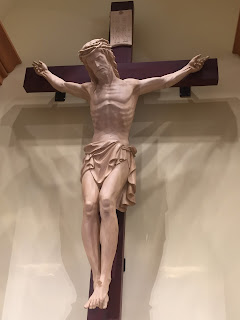While the entire space is truly beautiful, the most stunning part if you ask me is the crucifix, what I affectionately call Our Lady's Crucifix. Ever since this day I have been struggling to find the words to talk about this beautiful and inspirational crucifix. A crucifix unlike any I've seen before, or perhaps simply the first to cause such an internal longing that I've spent the last several weeks mulling over what to say.
Desperately I was hoping for something profound to say that could summarize this piece and spare anyone who reads this a lengthy read.
Listening to 'When I Survey the Wondrous Cross' (Click here to listen) I hoped to find inspiration. While a touchingly beautiful song, it did not prove to be beneficial in helping put an end to my writer's block.
When this proved unsuccessful I turned my attention to Scripture, immediately racing to St. Paul's letter to the Philippians, which contains passages always used when talking about Christology (See Philippians 2:6-11).
It wasn't until one day last week that I was finally struck with what to write. After daily mass, I decided to sit in a chair at the foot of this crucifix. I decided to spend an hour with Our Lady's Crucifix in the hopes of finally finding the words to say.
Within the first minutes of sitting down, I knew what to say. I knew that all I needed to know was the phrase "It is finished." A phrase I've used dozens of times when asked how a test or a paper or even an entire semester went. I would simply respond with "It is finished." This being a quote from Jesus himself. From the Gospel of John, Chapter 19 verse 30, "When Jesus had taken the wine, he said, 'It is finished.' And bowing his head, he handed over the spirit."
This is it, this is what I needed. After mere moments of sitting at the foot of this cross, my writer's block had seemingly evaporated.
The only explanation for this, the reason these words are so fitting, the reason, I believe why this, Our Lady's Crucifix speaks more to me than others I've seen and prayed before is because it is a clear depiction of not only a crucified Christ but a dead Christ.
This crucifix, with Jesus' shoulders, slightly slumped forward clearly depicts a Christ that has died. While this is by no means a new revelation in and of itself, it struck me in a way that hasn't before.
Jesus, a man who was fully human and fully divine died. Not only that however, he didn't simply die, he died a very painful and gruesome death. Something else that is clearly depicted in this crucifix.
As I sat, I began to notice the detail of the veins bulging in Jesus' thin arms. The cracked upper lip. The visible rib cage, the nail passing through his feet, the crown of thorns, his gaunt face, all clearly demonstrate the tremendous agony that was experienced.
Above Jesus' head is another unique aspect to this crucifix. While many include the inscription INRI, the inscription that Pilate included, "Jesus of Nazareth, the King of the Jews." This Crucifix, much like the actual Cross Jesus died on, according to John's Gospel (Jn 19:19-20), includes the inscription, or its abbreviation (INRI), in Latin, Greek, and Hebrew. While this may have been nothing more than an attempt historically to ensure that all who passed by could read it. It now serves as a reminder, that while I wonder in awe at Jesus' willingness to die on the cross for me, the truth is that salvation is for all.
While the entire sacred space of Our Lady Seat of Wisdom is truly a sight worth seeing, I find Our Lady's Crucifix to be most worthy of thoughtful prayer and reflection. Many hours since my initial attempt at curing my writer's block have been spent sitting at the foot of this crucifix and they have truly been spiritually enriching moments!
Peace and Blessings Always
~M









